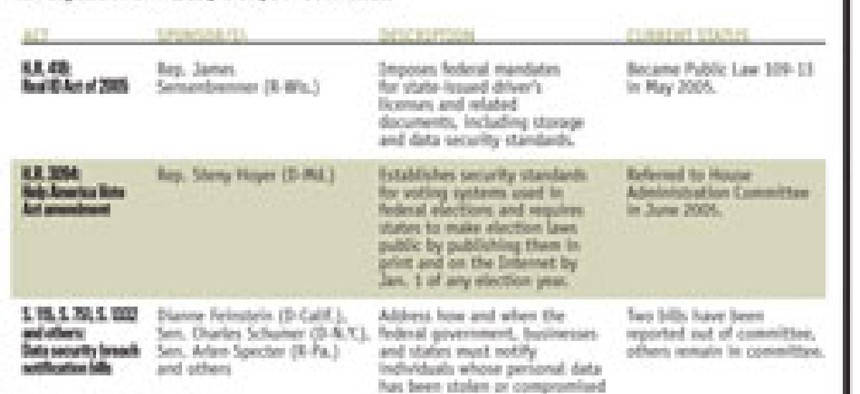States denounce federal pre-emption

Since 1990, Congress has enacted more than 117 laws that supersede states’ powers
State lawmakers say the federal government is usurping more of their power through new laws and regulations, a number of which include information technology requirements.
Federal legislative and regulatory pre-emptions erode state legislatures’ constitutional authority to protect their people and have other consequences, said Republican state Sen. Don Balfour of Georgia. In the past two fiscal years, Balfour said, states have picked up the tab for more than $75 billion in unfunded federal mandates.
Balfour, chairman of the National Conference of State Legislatures’ Standing Committees, attended NCSL’s spring forum in Washington, D.C. He and his legislative peers discussed pre-emption with their states’ congressional delegations.
“Pre-emption often isn’t the rallying cry that the unfunded mandates are, and their effects are not easily quantifiable, yet they’re just as insidious,” Balfour said at an April 6 press conference. “The usurping by the federal government of state authority subverts the federal system, chokes off innovation and ignores diversity among states.”
Democratic state Sen. Leticia Van de Putte of Texas, president-elect of NCSL, said that since 1990, Congress has enacted more than 117 laws that supersede state powers. Some of the measures have been good ones, such as the Americans with Disabilities Act of 1990. But she said there must be a strong state/federal partnership for addressing such issues.
NCSL released an updated version of its Preemption Monitor, which is a watch list of 72 bills or amendments proposed by the 109th Congress that organization members say usurp state powers. “That’s a 35 percent increase since our last update just in January of this year,” Van de Putte said.
The watch list includes the Real ID Act, enacted last year to establish national security standards for driver’s licenses and data storage and sharing requirements. The law, which passed without any hearings, requires states to comply by May 2008. State officials have said that compliance will cost them hundreds of millions of dollars.
Several federal bills requiring that citizens be notified of personal data breaches partially or entirely pre-empt state notification laws. Another bill imposes federal standards for creating statewide sex offender registry databases. Failure to comply could prompt a federal takeover of the registry and a loss of grant money. Other bills would prohibit states from passing laws that restrict the use of software that collects data on computer users. The legislation would impose penalties for violations.
Republican state Sen. Michael Balboni of New York included federal regulation among the pre-emptive threats to state laws. “It’s nothing more than a backdoor, underhanded means by which unelected federal bureaucrats impose their will on the states,” Balboni said at the press conference. “And when these regulatory pre-emptions occur, they cost the states.”
Pre-emption occurs every year, much like beach erosion, Balboni said. It’s not that exciting, but the effect is real, he added.
NEXT STORY: No good deed...



